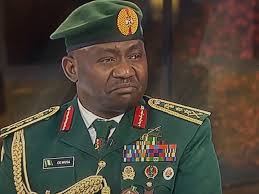
Ex-Defence Chief Christopher Musa Takes a Bow, Says He Leaves with a Clear Conscience
Despite widespread insecurity, worsening insurgency, and mounting allegations of human-rights abuses under his command, former Defence Chief Christopher Musa insists he leaves office “with a clear conscience.”
Abuja, Nigeria – October 31, 2025
Retired General Christopher Musa’s exit as Nigeria’s Chief of Defence Staff has drawn a mixture of indifference and criticism from citizens who believe his tenure coincided with one of the most unstable security periods in recent history.
Although Musa declared on Friday that he was leaving “with a clear conscience,” the statement has been met with skepticism from rights advocates and communities still reeling from violence across the country.
He made the statement during his pull-out parade in Abuja, adding, “I may be retiring from active military service today, but I am by no means retiring from my love for our dear country, Nigeria. I remain a soldier at heart and a patriot, ever loyal to the constitution and sovereignty of our great nation.”
His retirement, alongside other service chiefs, comes amid allegations of a coup plot involving military officers from Nigeria’s northern region.
During his tenure as defence chief, insecurity surged across multiple regions. In many northern local government areas, armed groups even went as far as collecting taxes, a reality that contrasts sharply with his claim of maintaining Nigeria’s sovereignty.
Fulani terror attacks continued unabated in the North-East and North-West, while unarmed civilians in the South-East faced military operations repeatedly condemned by human-rights groups for heavy-handed tactics and extrajudicial killings.
Civil-society observers argue that the army committed so much atrocities under his watch, and rather than restoring peace, many of those operations deepened distrust between the military and local communities.
Reports by organisations such as Amnesty International and Intersociety have documented reports of arbitrary arrests, enforced disappearances, and killings. Critics say these patterns reflect a deeper problem of accountability within Nigeria’s armed forces, one that Musa’s leadership did little to correct.
Analysts also point to the continued infiltration of Fulani terrorists elements into rural areas and the resilience of extremist groups as evidence that the government’s security strategy under his command was failing.
While the Defence Headquarters often celebrated tactical victories, the broader picture remained bleak: kidnappings increased, highways became unsafe, and internally displaced persons’ camps continued to swell.
The moral questions around faith-based violence also intensified. Christian communities in the Middle Belt and northern states reported repeated attacks from Fulani terrorists with little or no response from security forces, majority of the time the military is said to aid and guard the terrorists.
Lawmakers in the United States and European Union have echoed concerns that Nigeria’s government has been slow to confront what many describe as a religiously targeted pattern of killings.
Musa’s silence on these issues drew further criticism from observers who felt that the military establishment had lost its sense of moral urgency.
For many Nigerians, the general’s assertion that he leaves office “with a clear conscience” rings hollow. To them, the conscience of a nation is defined not by declarations at farewell ceremonies but by the lives saved or lost under one’s command.
Musa’s tenure will be remembered not for restoring confidence in Nigeria’s defence apparatus but for presiding over a period when insecurity, impunity, and public mistrust deepened.